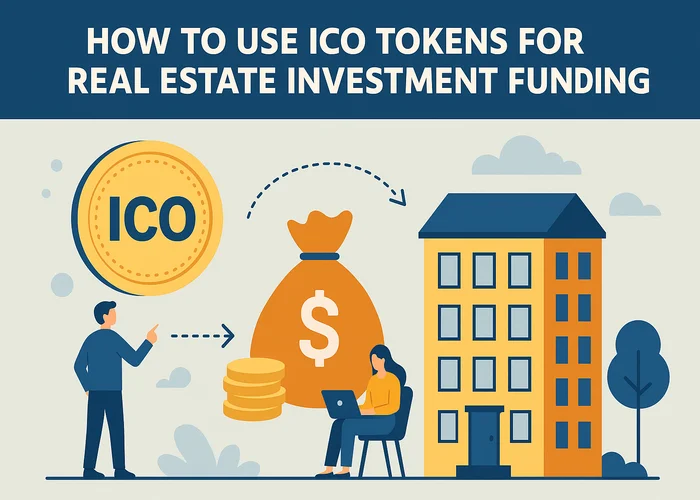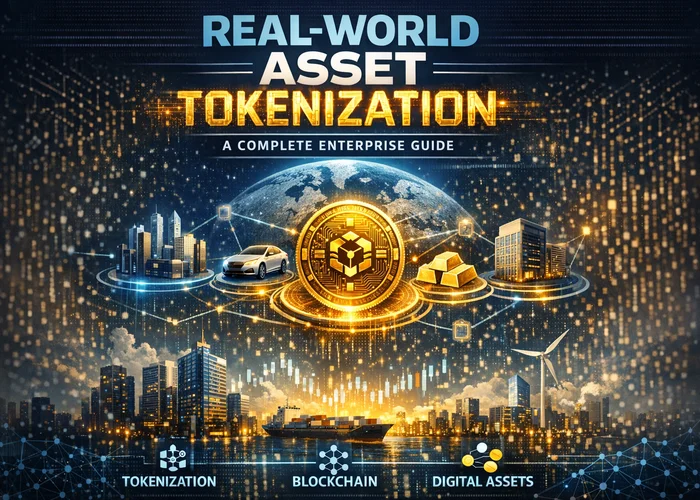The rise of ICO Tokens for Real Estate Investment Funding is redefining how property projects secure capital. Instead of relying solely on banks or institutional investors, developers can now reach a global pool of crypto investors through decentralized platforms. This innovative model enables fractional ownership, instant liquidity, and transparent transactions powered by blockchain.
As ICO Tokens for Real Estate Investment Funding gain momentum, both small and large investors can participate in lucrative property markets like never before. This evolution in real estate ICO investment is bridging traditional real estate with the limitless possibilities of blockchain technology.
Understanding ICO Tokens in Real Estate
What ICO Tokens Mean For Real Estate?
ICO tokens let developers sell digital tokens that represent a share in a property plan. ICO Tokens for Real Estate Investment Funding let small investors join deals that used to need large cash. In a token sale creators publish a plan, set supply, and accept crypto to buy tokens. This model speeds capital flow and opens global access.
For someone looking at real estate ICO investment, tokens cut middlemen and lower entry amounts. Smart contracts handle payments, record ownership claims, and enforce rules on the blockchain. These basics explain why token models are gaining use among builders and buyers worldwide.
Token Sale Mechanics And Funding Flow
Token sale mechanics define how capital moves from investors to property teams. ICO Tokens for Real Estate Investment Funding are issued as tokens with set supply and sale windows. Investors send crypto to a smart contract address; the contract mints tokens and logs buyer details. This flow supports Blockchain real estate funding by making transfers instant and transparent.
Property investment with ICO tokens allows funds to be split across escrow, development wallets, and reserves. KYC and on-chain audits link legal identities to token holders. Clear flow charts and escrow rules reduce risk and speed decisions for developers and backers. Today.
Using ICOs For Project Funding
Developers launch ICO real estate projects to raise money for building or buying properties. A project team lists goals, timelines, token rights, and legal structure before sale. Funds raised through ICO fundraising for property go into segregated accounts or programmable wallets that release money on milestones.
Investors receive tokenized real estate assets that may represent revenue shares, rent rights, or equity. Reporting dashboards show capital spent, construction status, and tenant data. Clear milestone audits and independent custodians help protect contributors. This setup turns long funding cycles into staged releases that match work progress and investor oversight. and routine compliance checks.
Risks And Safeguards
Real estate ICOs bring clear benefits but also risks. Benefits of ICO in real estate include faster funding, wider investor pools, and clearer transaction histories. Risks include token price swings, smart contract bugs, and unclear legal status in some countries. How ICO tokens fund real estate depends on secure code, audited contracts, and strong custody rules.
To cut risk, teams use third-party audits, multisig wallets, insurance for funds, and staged releases tied to milestones. Regulators often ask for clear investor rights and disclosure. Good governance and transparent reporting make Blockchain property investment safer for both builders and backers and lenders.
Tokenization Beyond Equity
Real estate tokenization turns physical assets into tradeable tokens. Real estate tokenization can represent whole buildings, floors, or income streams like rent and service fees. This change makes ownership divisible and tradable on secondary markets, improving liquidity for investors. Platforms use legal wrappers and compliant ledgers to match tokens with recorded title or rights.
Token standards define transfer rules and payout mechanics. For developers, tokenization simplifies fundraising and offers new exit paths. For investors, it opens low-cost access and portfolio flexibility. Market maturity will depend on clear law, exchange listings, and trusted custodians to link tokens to real assets. soon.
How ICO Tokens Enable Property Investment
1. Direct Funding Flow
Developers set goals and run a real estate token sale to collect capital fast. ICO real estate projects publish a plan, token rules, and funding targets up front. Investors send crypto to a contract that mints tokens and logs buyers. Funds go into separate accounts for escrow, building, and reserves to limit misuse.
This setup shows how ICO tokens fund real estate by linking money directly to work, with milestone releases and public records. ICO Tokens for Real Estate Investment Funding shorten the time to raise cash and give small investors a record and share in each step and oversight
2. Fractional Ownership And Liquidity
Fractional ownership lets many buyers join a single property. Property investment with ICO tokens breaks large costs into small parts so more people can buy in. Fractional tokens create tokenized real estate assets that represent shares or income rights. Real estate tokenization uses simple legal wrappers and on-chain records to match tokens with titles or contracts.
Secondary markets let owners trade slices and gain liquidity without long waits. For developers, selling small units raises money faster. For buyers, it gives price entry and easy exit. Regulators still watch legal steps and compliance closely
This setup shows how ICO tokens fund real estate by linking money directly to work, with milestone releases and public records. ICO Tokens for Real Estate Investment Funding shorten the time to raise cash and give small investors a record and share in each step and oversight
3. Platform Mechanics And Compliance
Platforms handle sales, custody, and reporting for token offerings. Real estate ICO platforms list projects, run KYC checks, and host wallets for funds. Clear rules on each platform help users compare risk, rights, and payout rules. Professional teams add audits and legal reviews to support Real estate ICO investment.
Investors use platform dashboards to track progress, payouts, and token balances. Developers link platform tools to accounting and escrow so cash flow is visible. Using these services, ICO Tokens for Real Estate Investment Funding become easier to run and monitor. Good platforms also offer dispute resolution and basic investor tools
4. Investor Access And Crowdfunding
Crowdfunding models use many small backers to fund property deals online. Real estate crowdfunding with crypto opens global pools of capital and cuts bank hurdles. For investors, Blockchain property investment brings clear records and automated payouts. For developers, on-chain rules reduce delays and speed transfers.
Stablecoin payments and audit trails help stabilize cash flow and reporting. The main Benefits of ICO in real estate include faster raises, split ownership, and clearer records. Teams must still manage tax, governance, and exit rules to keep trust high. Platforms add vetting, escrow and legal wrappers to protect both sides and provide clear reports
5. Post-Sale Management And Secondary Markets
After the sale, teams run accounts, pay investors, and handle upkeep on the asset. Good managers publish regular numbers for rent, costs, and profit so owners see returns. Secondary markets let holders trade shares when needed, giving buyers an exit route.
Stable custody and insured wallets keep funds safe while third party audits confirm records. Governance votes let token holders approve budgets, hires, or sales in plain steps. Clear payout schedules and simple rights reduce fights and help keep value steady over time. Teams set simple rules for fees, transfer limits and buyback options to protect long term holders too
Key Benefits of Real Estate ICOs
1. Increased Liquidity And Market Access
ICO Tokens for Real Estate Investment Funding let owners turn property into small, tradeable pieces. Tokenized real estate assets can list on dedicated exchanges or peer platforms, enabling buyers to sell quickly. These markets run day and night with lower fees than old-style brokers. Real estate crowdfunding with crypto widens the pool of buyers beyond local banks and funds.
Blockchain property investment makes transfers clear and fast by recording each move on a shared ledger. That trade flow helps set fair prices and brings cash to projects that need speed. Exchanges set clear limits daily.
2. Lower Capital Barriers
ICO Tokens for Real Estate Investment Funding reduce the minimum buy-in so many more people can invest. Real estate ICO investment breaks big costs into small units so private buyers can join. Crypto-based real estate investment opens global wallets without long bank checks or heavy paperwork.
Smaller tickets mean quicker raises and better price discovery, since more buyers can bid. The main Benefits of ICO in real estate include wider reach, faster closes, and clear ownership records that help both developers and buyers. Lower entry lets local savers and foreign buyers both join easily. This widens access.
3. Transparent Funding And Tracking
ICO fundraising for property uses smart contracts to lock funds and release them on set milestones. Each token offers records who paid and what rights they hold on a public ledger. Blockchain real estate funding cuts hidden steps: money paths, escrow rules, and payout formulas are visible.
Independent audits and on-chain proofs make it easy to check where capital went and how it was spent. This clear trail lowers fraud risk and helps regulators and investors verify progress. Stakeholders can view proof on public dashboards. On-chain records and timestamps add strong proof for audits.
4. Faster Fundraising And Execution
Real estate ICO platforms provide ready tools to launch a sale, run identity checks, and host wallets. ICO development for real estate covers token coding, legal wrappers, and integration with escrow and accounting. Teams can deploy a real estate token sale in weeks rather than months for bank loans.
How ICO tokens fund real estate in practice means staged payouts tied to construction or lease milestones, so money follows work. That speed helps teams move on chance deals and lets investors see value build fast. Investors see returns earlier. Developers use templates to speed legal checks.
5. Regulatory And Operational Controls
Good projects add clear governance rules, KYC checks, and custody for funds to meet laws. Multisig wallets, third-party custody, and insurance protect capital while teams build or rent property. Token rules can limit transfers, set buyback terms, or require voting on big moves, which keeps control clear.
Regular reports on rent, costs, and cash use make holders confident in returns and risks. Strong operations and clear legal steps help token projects run longer and keep investor trust. Legal teams and auditors must sign off on major moves. Clear rules reduce disputes and make final decisions faster.
Potential Challenges in ICO Real Estate Projects & How to Overcome It
1. Legal And Regulatory Hurdles
Navigating law is the first hard step for ICO Tokens for Real Estate Investment Funding. Teams must check if tokens count as securities in each country, file needed forms, and work with local lawyers. Clear rules on investor limits, tax, and reporting cut later trouble.
KYC and AML checks must run before any sale to meet bank and regulator needs. Using legal wrappers or special purpose vehicles links tokens to property rights in clear steps. Early contact with regulators and strict records lower the chance of fines or frozen funds and protect investor value long term.
2. Smart Contract And Code Risks
Code runs the sale and the asset rules for ICO real estate projects, so bugs can cost money fast. Teams must write clear, simple contracts, test on testnets, and run third party audits before any live sale. Use multisig wallets to stop single key failure and time locks to delay big transfers.
Consider simple upgrade paths with clear vote rules so fixes do not steal value. Bug bounties and formal checks cut risk. For crypto-based real estate investment, a clear rollback and rescue plan keeps funds safe. Keep backup keys and contact steps for emergencies.
3. Market Acceptance And Liquidity Limits
Many buyers still avoid ICO real estate projects, so plan for slow demand after a sale. Real estate tokenization widens who can buy, but tokens need places to trade or they stay locked. Work with exchanges, brokers, or create a peer market and set clear transfer rules to help trade.
Use buyback windows or liquidity pools to give holders a way out and to calm price swings. Real estate crowdfunding with crypto needs clear fees and proof of market to attract long term buyers and trusted partners. Show rent and sale data to build trust.
4. Operational Transparency And Reporting
Clear numbers matter after the raise to keep trust and meet law. Real estate ICO platforms should show where money sits, which accounts get paid, and what work is done at each step. Use on chain records for receipts and oracles to push off chain proof like permits and inspection reports.
Blockchain real estate funding makes timestamps and hashes public so auditors can check flows. Set routine independent checks and publish simple dashboards so token holders see how ICO tokens fund real estate and how cash moves. Link bank statements and invoices to monthly reports too.
5. Token Structure And Investor Rights
Clear token rules stop fights and protect value for holders of tokenized real estate assets. Define if tokens pay rent, share profit, or only give voting power so buyers know real rights. Set simple transfer rules, fee schedules, and buyback terms in the token code and the legal paper.
Good governance maps decisions to votes and thresholds so small holders do not block work. Make rights clear to avoid disputes and to make real estate ICO investment simple to check and to trade under law. Use plain term sheets to match code to law always.
The Future of Tokenized Real Estate and RWA Integration
RWA And Cross-Asset Basics
Real World Asset (RWA) Tokenization links real property to digital tokens so many investors can own parts of the same asset. RWA tokenization in real estate investment makes it simple to move value from one holder to another without long delays. ICO Tokens for Real Estate Investment Funding can work with Tokenized bonds and equity pieces to offer mixed funding paths.
Real Estate Tokenization Development Companies create the legal wrapper and the ledger mapping so tokens match deeds and bank records. This cross asset setup helps projects raise cash faster and share risk across different investor types and investors.
Integrating Bonds And Equity
Treasury Bonds Tokenization gives property teams a way to raise stable debt as tokens that pay set returns. Bond Tokenization can offer short or long pay schedules and make debt pieces tradeable on a market. Tokenized bonds can sit beside equity tokens so investors pick income or growth paths.
Private Equity Tokenization brings larger funds into later stage projects while private equity tokenization can also mean smaller funds split into tokens. This blend helps ICO projects split risk and match investor appetite with clear payout rules and simple escrow steps. These rules reduce confusion and speed up funding decisions now.
Platform And Legal Glue
Real Estate Tokenization Development Companies provide the software, legal forms, and custody that let sales run clean. UAE real estate tokenization and Dubai Real Estate Tokenization show local rule sets can support token sales when law and market work together.
Platforms run KYC checks, hold funds in multisig wallets, and post clear dashboards so buyers see payments and project progress. ICO Tokens for Real Estate Investment Funding rely on these platform steps to meet rules, tax, and audit needs. Good platforms also link on chain proofs with paper permits so audits can match code to real world files and reports.
Liquidity And Secondary Markets
Secondary markets matter because they let token holders sell without waiting years for a property exit. Bond Tokenization helps traders find income pieces that match risk profiles while market makers add buy and sell depth. RWA tokenization in real estate investment grows when clear exchanges and custody rules let money move fast.
Real World Asset Tokenization links title, rent records, and on chain proofs to make assets tradable. Tokenized bonds can sit next to equity tokens so portfolios blend steady income with growth chances. Good rules on fees, transfer windows, and custody lower rush selling and calm price swings.
Use Cases In The UAE
UAE real estate tokenization is growing as regulators and banks test token rules and welcome clear projects. Dubai Real Estate Tokenization has shown demand for hotel, retail, and tower shares sold as tokens to global buyers. Private Equity Tokenization brings big fund rules into token sales and makes large deals open to more partners.
Some firms also offer private equity tokenization services that split funds into smaller tradeable units with clear payouts and guardrails. This mix brings global money to local projects and speeds project start. Local platforms and Real Estate Tokenization Development Companies manage the legal links so tokens match titles.
Tech Standards And Next Steps
Standards and simple rules will let token markets scale without extra risk or confusion. Clear token formats, audit paths, and legal wrappers help banks and custodians accept tokens in daily work. Treasury Bonds Tokenization will push safe, low risk pieces into token markets and offer steady yield options for property portfolios.
Open APIs, standard transfer rules, and agreed custody checks let different platforms share liquidity and prevent lock-ins. When more firms adopt plain rules and shared tech, RWA token markets will link to banks and exchanges and serve many investor types. This work needs public guides and real tests.
Some firms also offer private equity tokenization services that split funds into smaller tradeable units with clear payouts and guardrails. This mix brings global money to local projects and speeds project start. Local platforms and Real Estate Tokenization Development Companies manage the legal links so tokens match titles.
Conclusion
ICO Tokens for Real Estate Investment Funding are changing how property projects raise and manage capital. Through blockchain real estate funding, investors get transparent, fast, and borderless access to property-backed assets. This shift removes old limits, opens global markets, and builds trust between developers and investors in one connected funding system.
Shamla Tech is a RWA tokenization development company offering full solutions for ICO Tokens for Real Estate Investment Funding. We help create secure token ecosystems, manage smart contracts, and handle compliance. Our tools make blockchain real estate funding simple, transparent, and scalable for developers, investors, and asset managers worldwide.








